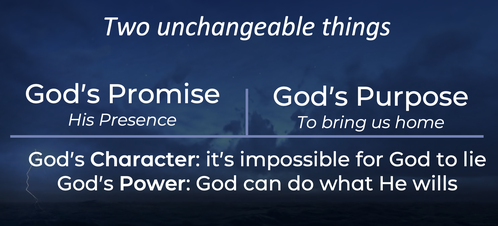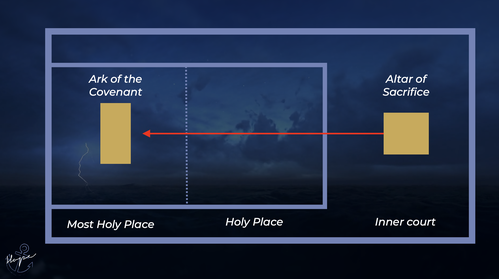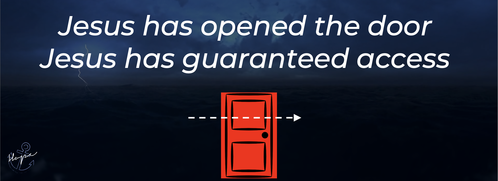In I Corinthians 13.13, the apostle Paul writes that ‘So now faith, hope, and love abide, these three; but the greatest of these is love’.
We know that we are saved by God’s grace, through faith, and so faith holds a perpetually prominent place in the Christian life. And we know that faith works through love – that love is the fruit of genuine faith and reflects God’s gracious character. And so love is the greatest. But what about hope? Compared with the ‘big brothers’ of faith and love, it seems that hopes gets easily passed over. But hope is one of ‘these three’, and we want to give it appropriate place in our lives.
The centrality of hope in the Christian life can be understood like this: if faith is what we do to enter the family, and love is the action we give ourselves to in the family, hope is the attitude of the family. That is, New Testament Christianity is marked by the attitude/emotion of hope.
We know that we are saved by God’s grace, through faith, and so faith holds a perpetually prominent place in the Christian life. And we know that faith works through love – that love is the fruit of genuine faith and reflects God’s gracious character. And so love is the greatest. But what about hope? Compared with the ‘big brothers’ of faith and love, it seems that hopes gets easily passed over. But hope is one of ‘these three’, and we want to give it appropriate place in our lives.
The centrality of hope in the Christian life can be understood like this: if faith is what we do to enter the family, and love is the action we give ourselves to in the family, hope is the attitude of the family. That is, New Testament Christianity is marked by the attitude/emotion of hope.
1. Natural Hope vs. Biblical Hope
But the hope we encounter in Scripture is different from the natural hope that is customary in our lives.
Natural hope goes like this: we want something to happen or to be true, and we usually have a good reason to think that it might. Natural hope means that we want something to happen and we think that it is possible. Natural hope is to wish for a particular event that is within the realm of possibility; it is to cherish a desire with anticipation.
That’s natural hope.
But biblical hope is the joyful, confident anticipation and expectation of something that is certain; specifically, the joyful and confident expectation of eternal salvation. In other words, God wants us to live with confident certainty that He is going to keep his promise to us.
We’re going to look at a key scripture – Hebrews 6.13-20, that describes the source, content, and outcome of this hope. To help us understand it, we’re going to frame this text around four key words: promises, oaths, anchors, and priests.
Natural hope goes like this: we want something to happen or to be true, and we usually have a good reason to think that it might. Natural hope means that we want something to happen and we think that it is possible. Natural hope is to wish for a particular event that is within the realm of possibility; it is to cherish a desire with anticipation.
That’s natural hope.
But biblical hope is the joyful, confident anticipation and expectation of something that is certain; specifically, the joyful and confident expectation of eternal salvation. In other words, God wants us to live with confident certainty that He is going to keep his promise to us.
We’re going to look at a key scripture – Hebrews 6.13-20, that describes the source, content, and outcome of this hope. To help us understand it, we’re going to frame this text around four key words: promises, oaths, anchors, and priests.
2. Promises: The God who makes promises
Look at Hebrews 6.13-15: For when God made a promise to Abraham, since he had no one greater by whom to swear, he swore by himself, saying, “Surely I will bless you and multiply you.” And thus Abraham, having patiently waited, obtained the promise.
There are three things I want you to see in this text: first, God made a promise and swore by himself that he would do it, Surely I will bless you… Second, Abraham is an example of appropriately responding to God’s promise: Abraham believed the promise, Abraham lived in the promise, Abraham received the promise. Third, we can borrow from this example and say this:being a Christian is about believing God’s promises, and living like it.
Everything we are going to say about hope comes from receiving God’s promises and believing them.
There are three things I want you to see in this text: first, God made a promise and swore by himself that he would do it, Surely I will bless you… Second, Abraham is an example of appropriately responding to God’s promise: Abraham believed the promise, Abraham lived in the promise, Abraham received the promise. Third, we can borrow from this example and say this:being a Christian is about believing God’s promises, and living like it.
Everything we are going to say about hope comes from receiving God’s promises and believing them.
3. Oaths: The God who guarantees promises
Look at Hebrews 6.16-17: For people swear by something greater than themselves, and in all their disputes an oath is final for confirmation. So when God desired to show more convincingly to the heirs of the promise the unchangeable character of his purpose, he guaranteed it with an oath.
These verses describe why God made an oath – he desired to show more convincingly. So there are two key things here that we need to learn. First, God swears by the greatness of himself so that we will be fully convinced. Swearing, as the author of Hebrews points out, is done by something greater than yourself. God’s dilemma is that He has no one greater than himself, and so he swears by himself: surely I will do this. And the reason for this swearing is so that we will be fully convinced. But convinced of what? This is the second point.
The second thing we need to see in this text is that God is going to fulfil his [unchangeable] purpose. This is what we need to be convinced of: God swears so that there will be no wavering in our hearts about whether or not he will keep his word.
Let's look at the Greek word for purpose, boulḗ, which means God’s resolved, unchangeable plan for which he purposefully arranges all circumstances so that His will is accomplished. This is simple, but profound: God knows what he wants to do, and God does what he wants to do. Our purposes are different: we make a plan, and it may or may not be done; sometimes we rely on outside circumstances going just right for our plans to come together. Not so with God – he has the ability to do exactly what he intends without reliance on anything or anyone else. And more than having the ability, this is what he does. Consider Isaiah 46.9-10:
For I am God, and there is no other; I am God, and there is none like me, declaring the end from the beginning and from ancient times things not yet done, saying, ‘My counsel shall stand, and I will accomplish all my purpose’.
Notice that God doesn’t say I might accomplish my purpose or I will accomplish some of my purpose. NO – God will accomplish all of his purpose.
These verses describe why God made an oath – he desired to show more convincingly. So there are two key things here that we need to learn. First, God swears by the greatness of himself so that we will be fully convinced. Swearing, as the author of Hebrews points out, is done by something greater than yourself. God’s dilemma is that He has no one greater than himself, and so he swears by himself: surely I will do this. And the reason for this swearing is so that we will be fully convinced. But convinced of what? This is the second point.
The second thing we need to see in this text is that God is going to fulfil his [unchangeable] purpose. This is what we need to be convinced of: God swears so that there will be no wavering in our hearts about whether or not he will keep his word.
Let's look at the Greek word for purpose, boulḗ, which means God’s resolved, unchangeable plan for which he purposefully arranges all circumstances so that His will is accomplished. This is simple, but profound: God knows what he wants to do, and God does what he wants to do. Our purposes are different: we make a plan, and it may or may not be done; sometimes we rely on outside circumstances going just right for our plans to come together. Not so with God – he has the ability to do exactly what he intends without reliance on anything or anyone else. And more than having the ability, this is what he does. Consider Isaiah 46.9-10:
For I am God, and there is no other; I am God, and there is none like me, declaring the end from the beginning and from ancient times things not yet done, saying, ‘My counsel shall stand, and I will accomplish all my purpose’.
Notice that God doesn’t say I might accomplish my purpose or I will accomplish some of my purpose. NO – God will accomplish all of his purpose.
4. Certainty: The God who keeps his promises
Before we get to anchors and priests, the author of Hebrews points to the character of God. Look at Hebrews 6.18:
… so that by two unchangeable things, in which it is impossible for God to lie, we who have fled for refuge might have strong encouragement to hold fast to the hope set before us.
The two unchangeable things are from the previous verse: God’s promise and God’s purpose. The promise is that we will be with him forever; that is, his presence. This is the final outworking of our salvation – we will be with him. The purpose, the boulḗ - the thing God is going to accomplish – God is going to bring us home to be with himself. And so we have his purpose and his promise – and this is the point of these verses – we can trust God to do both.
And so he points to God’s character – it is impossible for God to lie. That is, we can trust him completely to do what He has said. And more than that, on the basis of God’s power, we know He can do what He wills. Thus, God is completely trustworthy.
… so that by two unchangeable things, in which it is impossible for God to lie, we who have fled for refuge might have strong encouragement to hold fast to the hope set before us.
The two unchangeable things are from the previous verse: God’s promise and God’s purpose. The promise is that we will be with him forever; that is, his presence. This is the final outworking of our salvation – we will be with him. The purpose, the boulḗ - the thing God is going to accomplish – God is going to bring us home to be with himself. And so we have his purpose and his promise – and this is the point of these verses – we can trust God to do both.
And so he points to God’s character – it is impossible for God to lie. That is, we can trust him completely to do what He has said. And more than that, on the basis of God’s power, we know He can do what He wills. Thus, God is completely trustworthy.

Next, the author of Hebrews reminds us of his audience: we who have fled for refuge. This is who is writing to, this is who he is writing about. And this is ‘us’. Who are we? Those who have fled for refuge. There are two sides of our fleeing – fleeing from, and fleeing to. We have fled from God’s judgment against sin. We have fled to God’s salvation in Christ.
With all this in mind, we are given one remarkable result: all of this is so that we might have strong encouragement to hold fast to the hope set before us. First, we should feel strong encouragement to hang on because God is trustworthy.
Second, we should hold fast. That means to hang on tightly. This is the opposite of the song lyrics ‘just hold on loosely’ by the group 38 Special. That might be good advice for how to drive a motorcycle, but not for our relationship with God. But the good news for us is that our salvation is not based on our ability to hang on to God, but God’s ability to hang on to us. Like a small child in their parents arms, hanging on is the right thing to do. But their safety, like ours with God, is found in their parents strength in holding on to them.
This hanging on to hope is summarised for us in Hebrews 10.23: Let us hold fast the confession of our hope without wavering, for he who promised is faithful. We have a hope confession – God will complete our salvation and bring us home; we have an action – hang on to the promise without waving; we have a rationale – God whom promises is faithful.
With all this in mind, we are given one remarkable result: all of this is so that we might have strong encouragement to hold fast to the hope set before us. First, we should feel strong encouragement to hang on because God is trustworthy.
Second, we should hold fast. That means to hang on tightly. This is the opposite of the song lyrics ‘just hold on loosely’ by the group 38 Special. That might be good advice for how to drive a motorcycle, but not for our relationship with God. But the good news for us is that our salvation is not based on our ability to hang on to God, but God’s ability to hang on to us. Like a small child in their parents arms, hanging on is the right thing to do. But their safety, like ours with God, is found in their parents strength in holding on to them.
This hanging on to hope is summarised for us in Hebrews 10.23: Let us hold fast the confession of our hope without wavering, for he who promised is faithful. We have a hope confession – God will complete our salvation and bring us home; we have an action – hang on to the promise without waving; we have a rationale – God whom promises is faithful.
5. Anchors: The God who Gives Hope

Finally, having laid this foundation of confident trust in God’s promises, we come to description of our hope as an anchor:
We have this as a sure and steadfast anchor of the soul, a hope that enters into the inner place behind the curtain (Hebrews 6.19).
First, notice that the this in verse 19 is the hope set before us from verse 18. Thus, the hope that is set before us – God’s promise of being united with him in his presence forever (explained below) – it is this hope that is an anchor.
The picture of anchor points to something that gives stability in times of shaking or trouble. To anchor the soul means that our souls – our heart, our minds, our emotions – have a source of stability. And that source of stability is the hope we have. And this is where we get into the content of that hope: it is a hope that enters into the inner place behind the curtain.
In ancient Israel, every year, on the day of atonement, both in the tabernacle and later in the temple, the high priest would take blood from a sacrificial bull into the holy place, through the curtain, into the most holy place, and sprinkle it on the ark of the covenant. God’s presence dwelt in the most holy place, and so the symbolism is clear: sins are atoned for by blood sacrifice, and it is by this blood that we gain access to God’s presence.
We have this as a sure and steadfast anchor of the soul, a hope that enters into the inner place behind the curtain (Hebrews 6.19).
First, notice that the this in verse 19 is the hope set before us from verse 18. Thus, the hope that is set before us – God’s promise of being united with him in his presence forever (explained below) – it is this hope that is an anchor.
The picture of anchor points to something that gives stability in times of shaking or trouble. To anchor the soul means that our souls – our heart, our minds, our emotions – have a source of stability. And that source of stability is the hope we have. And this is where we get into the content of that hope: it is a hope that enters into the inner place behind the curtain.
In ancient Israel, every year, on the day of atonement, both in the tabernacle and later in the temple, the high priest would take blood from a sacrificial bull into the holy place, through the curtain, into the most holy place, and sprinkle it on the ark of the covenant. God’s presence dwelt in the most holy place, and so the symbolism is clear: sins are atoned for by blood sacrifice, and it is by this blood that we gain access to God’s presence.

Remember that this picture points to Christ: that is, Jesus accomplished for real what the priests symbolised on the day of atonement. The real inner place is heaven, the very presence of God. Jesus took his own blood, the blood he shed on the cross on our behalf. This act of opening access is described in Hebrews 10.20:
… by the new and living way that he opened for us through the curtain, that is, through his flesh.
In the same way that the flesh of Jesus was ‘opened’ by being pierced, the curtain that kept people from the presence of God was torn in two, demonstrating that through the sacrifice of Jesus, we have access to God.
Hebrews 6.20 continues with this description: where Jesus has gone as a forerunner on our behalf. The where is heaven – the very presence of God. To be a forerunner means to go before. That is, Jesus has blazed the trail; he has gone before so that where Jesus is, we’re going to be. This is our hope: God is going to bring us into his very presence through Jesus.
We can say it like this: Jesus has gone into the inner place behind the curtain as a forerunner and priest on our behalf. And this leads on to the next key word:
… by the new and living way that he opened for us through the curtain, that is, through his flesh.
In the same way that the flesh of Jesus was ‘opened’ by being pierced, the curtain that kept people from the presence of God was torn in two, demonstrating that through the sacrifice of Jesus, we have access to God.
Hebrews 6.20 continues with this description: where Jesus has gone as a forerunner on our behalf. The where is heaven – the very presence of God. To be a forerunner means to go before. That is, Jesus has blazed the trail; he has gone before so that where Jesus is, we’re going to be. This is our hope: God is going to bring us into his very presence through Jesus.
We can say it like this: Jesus has gone into the inner place behind the curtain as a forerunner and priest on our behalf. And this leads on to the next key word:
6. Priest: The God Who Gives Hope
Not only is Jesus a forerunner, he is our high priest: having become a high priest for ever. That is, like the high priests in ancient Israel, but better, Jesus has accomplished atonement for us.
A priest is an intermediary, someone who represents people to God. As our priest, Jesus has opened AND guaranteed access to God through his blood. That is, Jesus has opened the door Jesus has guaranteed access.
A priest is an intermediary, someone who represents people to God. As our priest, Jesus has opened AND guaranteed access to God through his blood. That is, Jesus has opened the door Jesus has guaranteed access.

Imagine that a friend invites you to a really exclusive club; the cover charge to get in is £100,000, and everyone their wears uber expensive designer clothes. You think, ‘No way! I’ll never get in!’. And your friend says, ‘I’ve got you covered’. And so you go along, and you discover that not only has your friend paid the cover charge for you, your friend has given you a new set of clothes.
This is what Jesus has done for us: he paid the cover charge for our access to heaven through the blood he shed on the cross, and he clothes us with the gift of his righteousness. In other words, through Jesus, we have access to very presence of God. It’s covered.
This is what Jesus has done for us: he paid the cover charge for our access to heaven through the blood he shed on the cross, and he clothes us with the gift of his righteousness. In other words, through Jesus, we have access to very presence of God. It’s covered.
7. Confident Hope In God
God wants us to live in confident hope, the hope that He will keep his word, the hope that He will save us to the uttermost and eventually bring us home to be with him forever in his presence. I’ve tried to make this as clear as possible, but in case you missed the point, here are the two key takeaways:
* We have hope because GOD KEEPS HIS PROMISES
* We have hope because JESUS GUARANTEES ACCESS TO GOD’S PRESENCE.
This is good news: live in your confident hope in Christ this week!
* We have hope because GOD KEEPS HIS PROMISES
* We have hope because JESUS GUARANTEES ACCESS TO GOD’S PRESENCE.
This is good news: live in your confident hope in Christ this week!
Recent
Archive
2023
January
2022
2021
January
April
May
July
September
October
November
December
Categories
no categories
